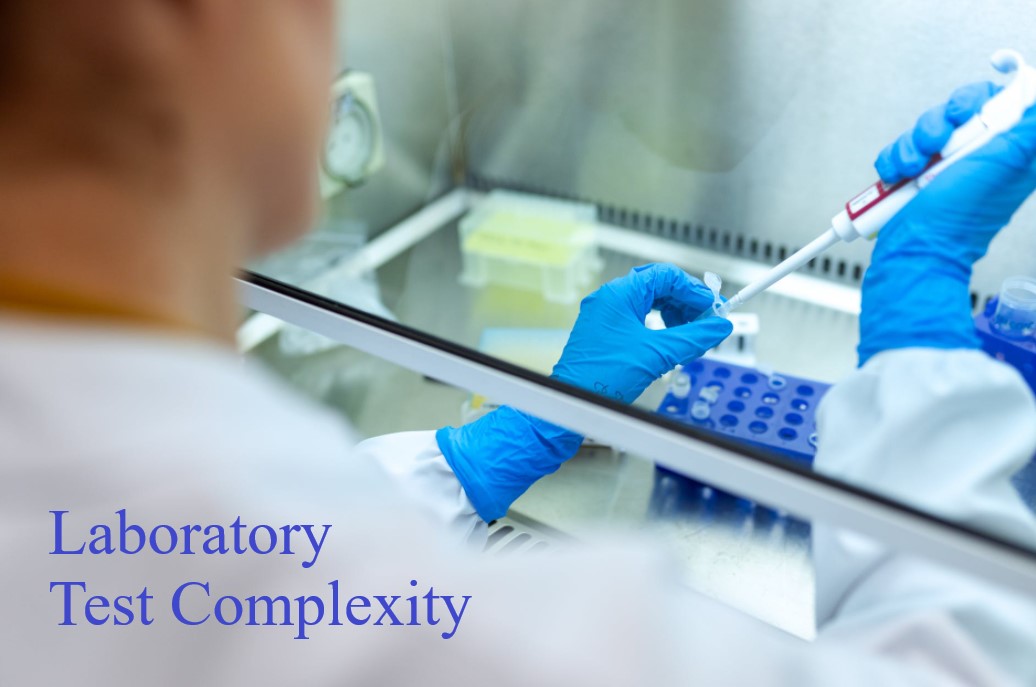In our blog in August 2020, we gave an overview of laboratory regulation. Today we’ll discuss the details of test complexity defined by the Clinical Laboratory Improvement Amendments. The full regulation can be found at www.eCFR.gov. Search for Title 42, Chapter IV, Subchapter G, Part 493.
What kinds of labs must be CLIA certified?
Any lab that analyzes human specimens to assist with diagnosing, preventing, or treating disease/impairment, or with assessing individual patient health must be CLIA certified. There are exceptions, including:
- labs that only perform forensic testing,
- research labs that test human specimens but do not provide results for diagnosis, prevention, treatment, or assessment of individual patients, and
- federal labs with modified requirements as determined by the Secretary.
Lab Test Complexity
CLIA separates the levels of difficulty of lab test analysis into 3 primary categories.
- Waived tests
- Moderate complexity tests, including provider performed microscopy
- High complexity tests
Waived Tests
Labs, physician offices, or any facility performing waived tests only must have a certificate of waiver from the organization that oversees CLIA laboratories. In Ohio, this is the Ohio Department of Health.
Types of tests that can be performed using a certificate of waiver:
- Are simple lab exams and procedures that have no reasonable risk of patient harm if the test is performed incorrectly.
- Must be cleared by the Food and Drug Administration for home use.
- Must use methods so simple and accurate that it is difficult to get the result wrong.
Examples of these very simple tests that require no advanced training in laboratory science include:
- Manually read dipstick or tablet reagent urine tests.
- Manually performed fecal occult blood tests.
- Ovulation tests using color development to read the result.
- Urine pregnancy tests using color development to read the result.
- Manual erythrocyte sedimentation rate.
- Hemoglobin using copper sulfate method.
- Blood glucose using a home glucose meter cleared by the FDA.
- Hematocrit using a microhematocrit centrifuge.
- Hemoglobin using an analyzer that only tests hemoglobin and is self-contained and provides direct measurement and printout instead of calculating from another lab result.
The most important thing that labs must do if performing waived testing is to follow the manufacturer’s instructions for performing the test exactly. Any deviation from the manufacturer’s instructions makes the test a laboratory-developed test because it is being used off label, according to the FDA. This automatically puts the test into the high complexity category, with much more stringent rules and regulations.
Moderate and High Complexity Tests
Depending on the type of testing performed, labs performing moderately or highly complex tests must
- have a certificate of accreditation,
- successfully perform proficiency testing on blind samples to ensure the lab can obtain accurate results,
- develop and follow a quality system that allows continuous improvement of lab processes,
- ensure laboratory professionals have the correct education and training to perform the level of tests being used in the lab,
- must submit to and successfully pass inspections by an appropriate regulatory agency, and
- have facilities designed to safely perform tests, reduce risk of specimen and test supply contamination, adhere to Federal, State, and Local lab requirements, and provide safe storage conditions for specimens and records.
CLIA has a complexity scoring system for every assay that is approved by the FDA. This system ranks the following areas for each test, scoring each category from 1 – 3, with lower scores requiring less specialized knowledge/skills and systems that are difficult to mishandle and misinterpret. If the score total is 12 or less, the test is moderate complexity. If it is higher than 12, it is high complexity.
- Knowledge – the amount of scientific and technical knowledge required to perform the test.
- Training and experience – whether or not specialized training and substantial experience is needed to perform all phases of testing.
- Reagent and material preparation – how much meticulous manual preparation of testing materials is involved.
- Characteristics of steps in the analytical process – how much control and monitoring of the steps are required to accurately complete the test, such as specimen preparation, temperature control, timing, accurate pipetting, and calculations.
- Calibration, quality control, and proficiency testing material – how stable and readily available these materials are for the assay.
- Troubleshooting and equipment maintenance – whether or not troubleshooting is automatic by an instrument or requires extensive decision making and special knowledge, skills, or abilities to perform maintenance and troubleshooting.
- Interpretation and judgement – whether or not extensive independent interpretation and judgment are needed to perform the processes.
Point-of-care instrumentation often falls into the moderately complex category. This could include instruments that perform blood gases, troponin, glucose, creatinine, hemoglobin, and other tests using instruments that require a low level of skill to operate, and minimal interpretation by the person performing the test.
Testing in Blood Bank, Microbiology, and Molecular Diagnostics often fall into the highly complex category. Scientists working in these areas must have specialized training in clinical laboratory science along with sufficient work experience to accurately perform and interpret tests in these disciplines.
Why is test complexity important?
Imagine if your favorite actor was preparing donor units of blood to transfuse to your mother. He has no training in how to do a type and screen with crossmatch. He has no idea what a transfusion reaction is or what causes it. He doesn’t even know what all the blood types are, let alone which ones are compatible to transfuse to your mother.
Would you want this awesome actor to prepare the units for your mother, knowing that if they are prepared incorrectly, your mother could die within 15 minutes of the start of the transfusion?
I hope the answer is “No!”
Your favorite actor was trained to act, not to analyze patient specimens. So pay to watch them in their movies and shows. The Medical Laboratory Scientists will take care of getting blood ready for your mother’s transfusion.
We love what we do and we are passionate about being correct and doing things the way they should be done. This is the type of person you want to perform your tests and we scientists love to do them for you.
You can do a home pregnancy test yourself, and so can a scientist. The risk of doing it wrong because of the way it was manufactured is very low. So, no special knowledge or skills are needed to perform the test. This is waived testing and we need to know which tests fall into the category to know if they can be done by just about anyone or not.
Pre-transfusion testing has a huge amount of risk if performed incorrectly. Patients can be harmed or die if the testing is done wrong. Only those people who have the appropriate education and training as defined by CLIA have the knowledge and skills to do this testing and lower the risk of it being performed wrong. This is high complexity testing. We definitely need to know which tests are in this category to ensure we have properly educated and trained scientists doing the analysis.
The education and training requirements for testing personnel are also included in the Code of Federal Regulations. These were discussed in a previous blog and we recommend looking back at the blog from April for those details.
Interested in become a Medical Laboratory Scientist?
We are always looking for more scientists to join our profession. Visit www.ascls.org to find out more.


Thank you so much for your thoughts on our website and our blog on Laboratory Test Complexity. Please make sure to check back often and follow Med Lab Study Hall on social media.